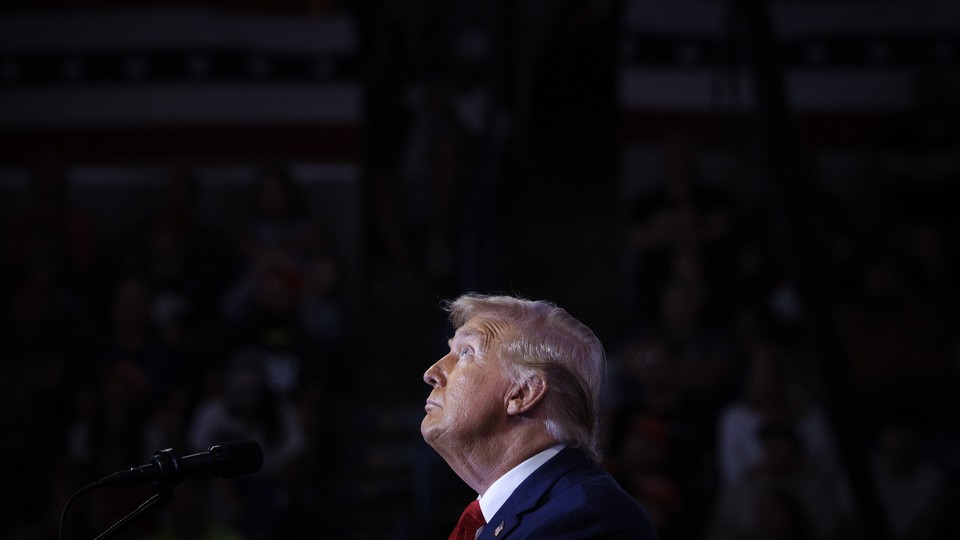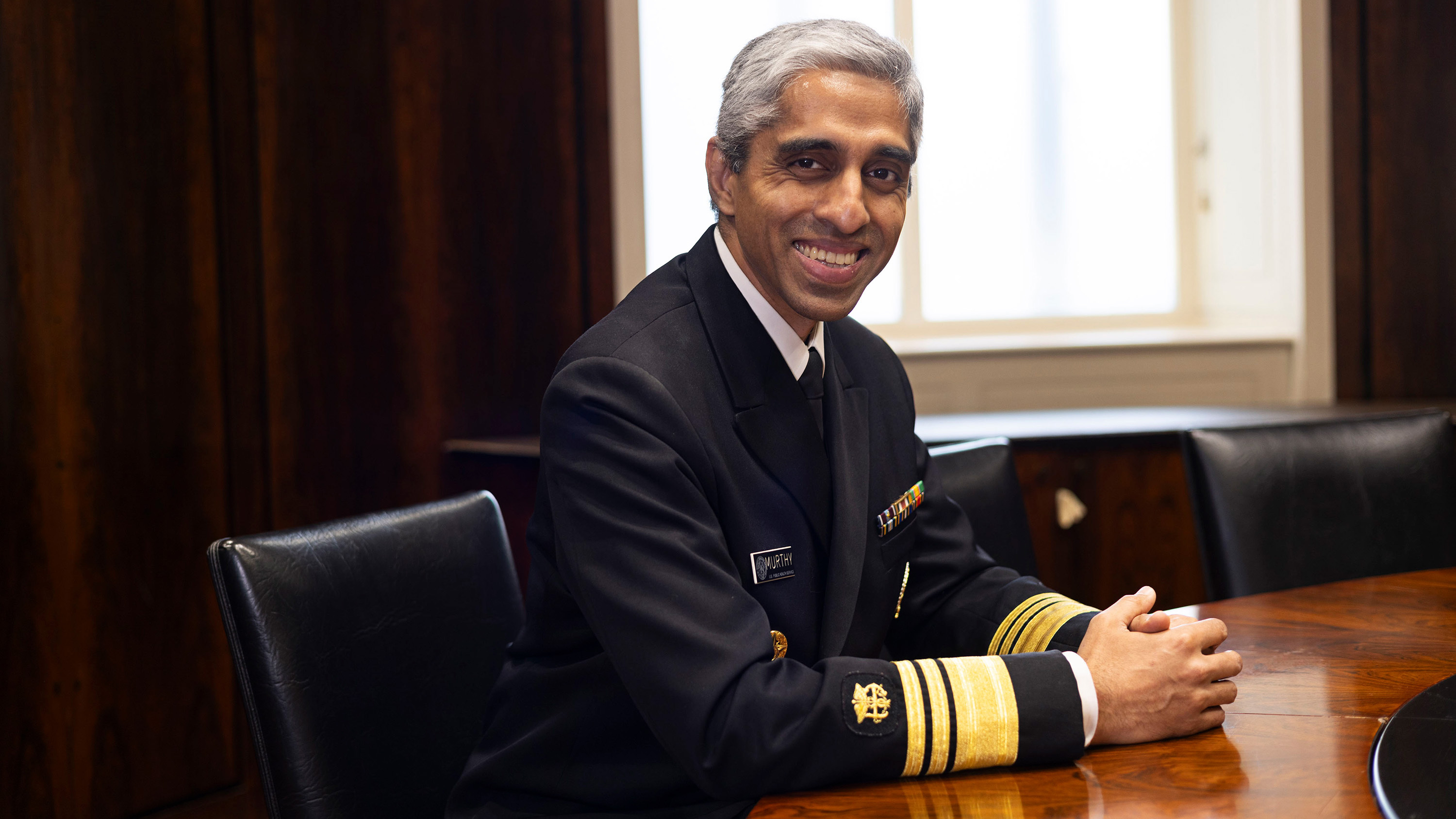Donald Trump’s Stock Is Sinking
6 min read
This is an edition of The Atlantic Daily, a newsletter that guides you through the biggest stories of the day, helps you discover new ideas, and recommends the best in culture. Sign up for it here.
While the Democrats have been rallying their supporters in Chicago, Donald Trump has been posting. On his social-media site, Truth Social, he made anti-Semitic remarks about Pennsylvania Governor Josh Shapiro and falsely accused the Democrats of orchestrating a coup. He posted dozens of times during the proceedings Tuesday evening. And he’s just getting started: Trump announced to his followers that he would be doing a “LIVE PLAY BY PLAY” on Truth Social tonight of Kamala Harris’s speech. But Trump’s prolific usage of his own social-media platform belies its limitations. With reportedly meager user numbers in the single millions, Trump’s Truth Social posts reach primarily an audience of his staunchest loyalists.
About a year after being kicked off of every major social-media platform following the January 6 insurrection, Trump launched Truth Social, and for a while, he focused his posting energy exclusively on the platform. The company’s financials have been turbulent since it went public, in March. By the end of its first day of trading, stock of DJT—the ticker symbol that represents Truth Social’s parent company, Trump Media—was worth about $8 billion, and its value has fluctuated wildly ever since. The stock has lost almost half of its value since mid-July, and earlier this week, it dipped to its lowest point since the company debuted on the exchanges.
Companies’ stock prices drop all the time for various reasons. But this price never seemed all that tied to real-world value to begin with. As the financial columnist Matt Levine wrote in his Bloomberg newsletter last month, DJT is “a highly valued public company stapled to a teeny little operating business.” Investors put money in not because they “project high future operating cash flows but because Trump Media has ‘Trump’ in the name, is largely owned by Donald Trump, and represents a bet on his electoral fortunes and general newsworthiness,” Levine notes. Some investors have gone as far as to say that they view their shares largely as a way to support Trump, not necessarily as a way to make money.
Trump Media falls squarely into the phenomenon known as the “meme stock.” As James Surowiecki wrote in The Atlantic earlier this year, “Like GameStop and AMC before it, it trades not on fundamentals, but on emotion.” And Truth Social is not flourishing: The company’s latest earnings report said that it posted a loss of more than $16 million last quarter; its revenue was $836,900, reportedly down 30 percent from the year before. It is mired in legal issues, and the company spends many more millions than it brings in. The site also relies heavily on a limited group of Trump-aligned businesses for ad revenue.
For all its woes, Truth Social could still make Trump a lot wealthier. Trump owns about 60 percent of the company, which puts his on-paper value from it at several billion dollars. Forbes estimated in May that the bulk of his wealth now comes from the company. His stake is locked up until next month, at which point he could sell off his shares to raise money (though such a sell-off could again tank the value of the stock—and his camp has denied that he would do this).
If Trump wins in November, all of this would create the potential for conflicts of interest even more extreme than the hotel ties he had during his first turn in office: Anyone who wishes to show fealty to, or get attention from, the president could theoretically purchase shares of the company and bolster Trump’s personal wealth. Historically, the norm is for presidents to give up or step away from business interests when elected. But Trump was not eager to comply in the past, and it’s unclear how he’d navigate this in the future.
Now Trump has ventured back to his former stomping grounds, X, where he has 90 million followers, compared with 7.5 million on his own site. Since his livestream on X with Elon Musk (who has welcomed him back to the platform with open arms) earlier this month, he has started regularly sharing videos and graphics. His longer screeds are still being directed mostly toward his loyal fans on Truth Social. But it seems that, even as he single-handedly props up the value of his own site, Trump is finding it hard to resist the siren call of more attention on X.
Related:
- Trump Media is the new Bed Bath & Beyond.
- Elon Musk throws a Trump rally.
Here are four new stories from The Atlantic:
- Are you sure your house is worth that much?
- Why the “Blue Wall” looms so large
- The asterisk on Kamala Harris’s poll numbers
- She’s everything. He’s just Doug.
Today’s News
- Vice President Kamala Harris will speak tonight at the Democratic National Convention to accept the nomination to be her party’s presidential candidate.
- The Supreme Court allowed Arizona to enforce a provision in a Republican-backed state law that will bar new voters from registering to vote in state and local elections if they do not have any proof of citizenship.
- The FDA approved an updated version of the COVID-19 vaccines from Pfizer and Moderna. They will be available within the next week.
Dispatches
- The Weekly Planet: Ford is pivoting to small electric cars, Patrick George writes. Will a country of SUV lovers actually buy them?
- Time-Travel Thursdays: Motor-vehicle deaths are still a big issue, Sarah Laskow writes. Everything we’ve tried so far hasn’t solved for drivers’ bad judgment.
Explore all of our newsletters here.
Evening Read

America Could Do Without Its Chief Wellness Officer
By Benjamin Mazer
Vivek Murthy, the surgeon general of the United States, used to spend his time focused on the traditional issues of the nation’s doctor. He led campaigns and authored reports to promote physical activity, limit adolescents’ vaping, and improve treatment for alcohol and drug addiction. He reminded us to eat our fruits and vegetables.
These days, he’s more likely to talk about friendship and Americans’ desperate need for more of it.
Read the full article.
More From The Atlantic
- Young Democrats have a new favorite Clinton.
- Who’s normal now?
- The ultimate happiness diet
- The Democrats’ COVID amnesia
- Sometimes you just have to ignore the economists.
- Barack Obama’s warning to Democrats
- Silicon Valley is coming out in force against an AI-safety bill.
Culture Break

Watch. Gena Rowlands mined the many contradictions of romantic love in her work, and never more brilliantly than in A Woman Under the Influence (streaming on Max), Christina Newland writes.
Read. Andrew O’Hagan’s new book, Caledonian Road, shows a vision of England today, dark and rotten, Randy Boyagoda writes.
Play our daily crossword.
P.S.
At the DNC this week, Democrats have been making much of Tim Walz’s plaid-shirt-and-baseball-hat wardrobe (though he has donned suits for the event). Barack Obama praised the VP candidate’s attire on night two. And last night, Senator Amy Klobuchar said that Minnesotans “love a dad in plaid.” In The Washington Post today, the fashion writer Rachel Tashjian looks at how Walz’s wardrobe “is one of the Democrats’ best arguments that theirs is not the party of the coastal elite,” and notes that Walz manages to send his message just by wearing his usual clothes. “It’s funny to imagine a political party foregrounding a woman’s down-to-earth wardrobe: We just love the senator for wearing those Lululemon leggings.To be taken more seriously, at this level of politics, a man dresses down and a woman dresses up,” she writes.
— Lora
Stephanie Bai contributed to this newsletter.
When you buy a book using a link in this newsletter, we receive a commission. Thank you for supporting The Atlantic.



